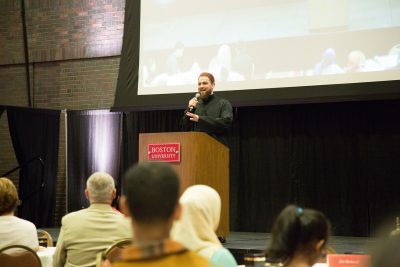
Around 500 people attended the annual Eid al-Adha banquet hosted by the Islamic Society of Boston University Sunday evening. Attendees were greeted by a Henna station, a picture backdrop of lights and balloons, and boxes shaped like the Kaaba, a pre-Islamic monument in Mecca, filled with Hershey’s Kisses on tables scattered through Metcalf Hall.
Though the Muslim Eid al-Adha, also known as “Festival of Sacrifice” took place in August, in past years, the holiday had taken place during the school year. Worshippers honor and celebrate the trials of prophet Ibrahim for the holiday.
Through the banquet and keynote speaker, the ISBU is able to inform the BU community about Islam, said Mehwish Khan, president of ISBU and a senior in the Sargent College of Health and Rehabilitation Sciences. It also provides a community for Muslims at BU to celebrate the occasion, though they may be far from friends and family.
“It’s hard for other Muslims around campus to celebrate this holiday,” Khan said, “because depending when Eid happens, a lot of students are either in Boston or at work or taking classes, so they don’t get that opportunity to celebrate Eid with their family and friends.”
ISBU strives to create a community for Muslims on campus to feel at home and welcome, Vice President Salam Hasaba said, and to practice their faith unapologetically.
“Having an event like this provides them with this outlet to express themselves,” Hasaba said, “[it] recognizes that holiday for them and educates the non-Muslims on campus.”
Student performers at the event were a new addition this year and included a comedic routine, beatboxing and spoken word, Khan said.
Ustadh AbdelRahman Murphy, the keynote speaker for the event, is an instructor at Qalam Institute and the director of Roots, which is a community space in Irving, Texas.
Khan said that Ustadh Murphy was a cleric many years ago at the Islamic Society of Boston Cultural Center.
“People know him,” Khan said, “ We chose him because he had that connection with Boston before, and our theme this year is community, so we felt he’s the best person for that. He knows everyone, he knows Boston, we thought that people could really connect to him.”
Ustadh Murphy’s speech revolved around the theme of building bridges and community.
“There are some very powerful things that we can learn from our own history, from the Muslim tradition, from the life of the Prophet, peace be upon him, as well as from the world that we live in today about where we can harvest beauty and community from,” Ustadh Murphy said.
His oratory included stories on the relationship of mental health with fellowship, race and respect in a community and the bravery of being inclusive. He referred to the diversity of the audience from ethnicity, character, heritage and experience to encourage the notion of getting to know one another.
“Seek a moment where you have one of two choices,” Ustadh Murphy said, “where you can either go towards the path of comfort, but there’s nothing built, nothing is improved. You’re just comfortable. Or you can choose to stand directly in opposition to all of your fears about getting outside of your comfort zone, and as a result, is that you’ve made this world a better place to live in for people.”
Yusuf Nasrullah, 43, of Cambridge, said that events hosted by local Muslim communities in Boston are a wonderful way to build a community.
“In the backdrop of Islamophobia and a lot of confusion about Islam, it is a very good step for local Muslim communities in all the cities across the USA to have such events where people can mingle,” Nasrullah said. “I love seeing how the Muslim community, especially the younger students, how they react to issues and what strategies they have.”
Karen Sargent, a graduate student in the School of Theology, said she has always been interested in Islam as a religion, especially as she had studied it in her undergraduate years.
“I just think it’s really wonderful to be able to experience things in other people’s traditions and other people’s religions,” Sargent said, “and being able to share that is really special.”























































































































